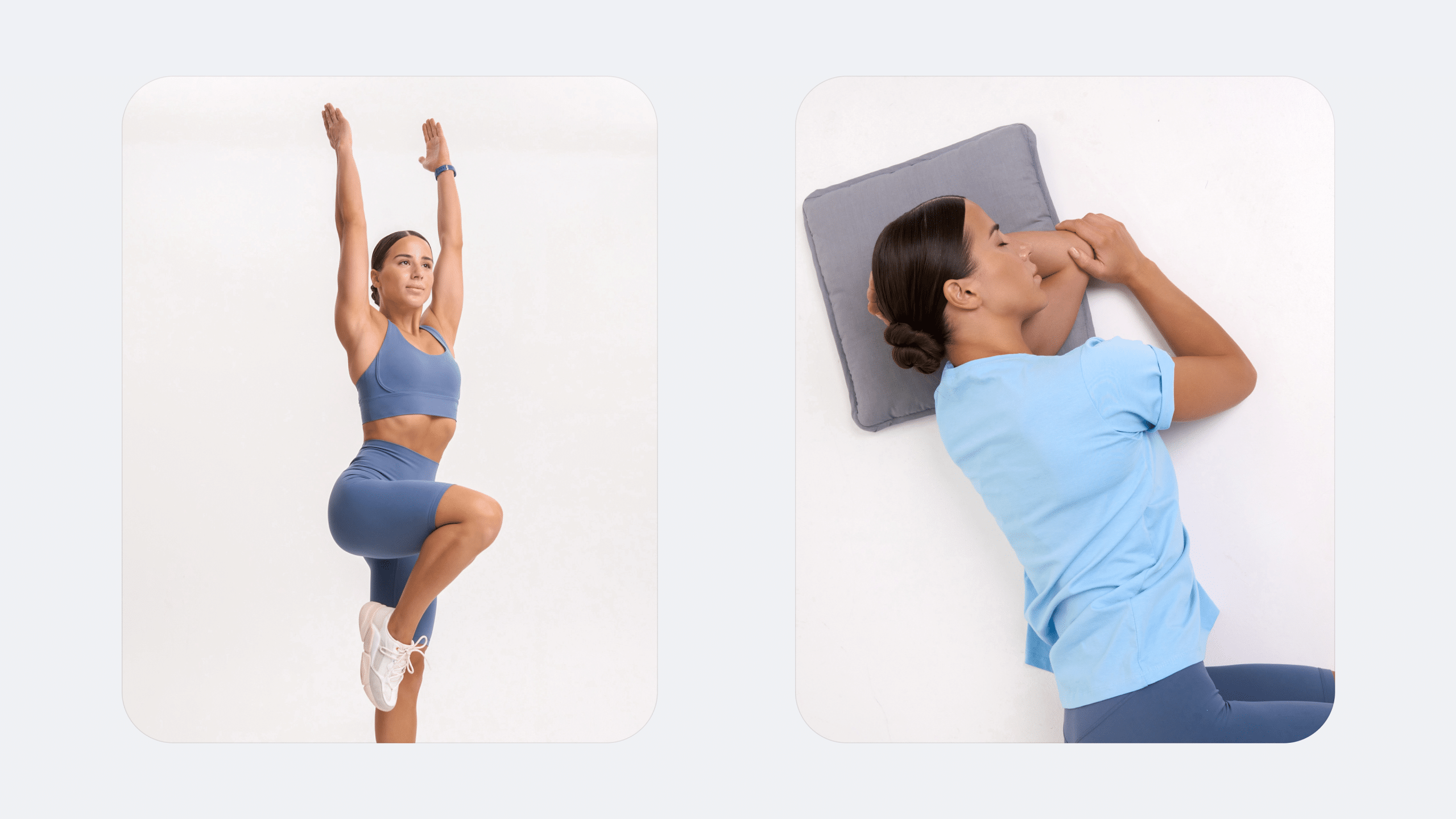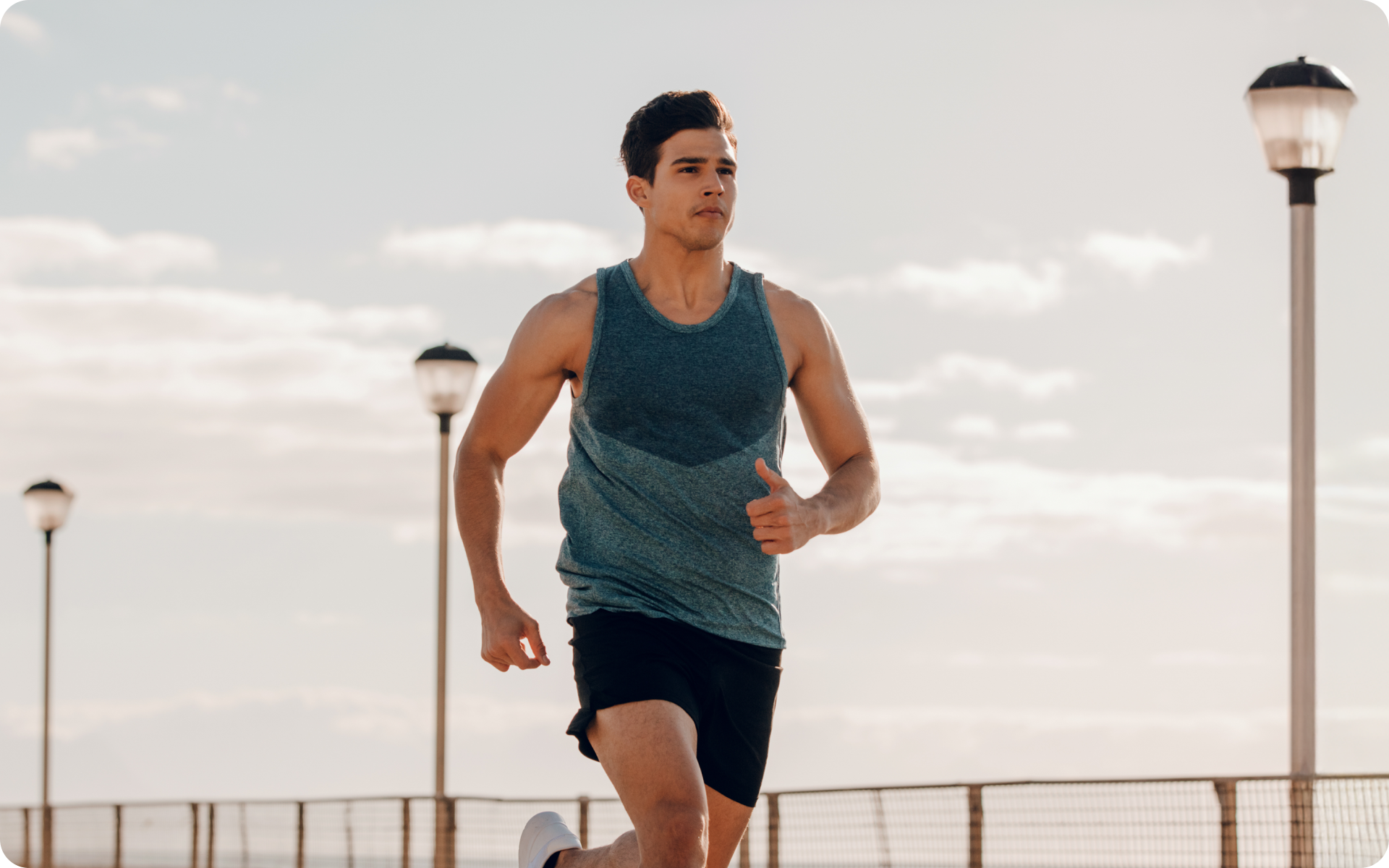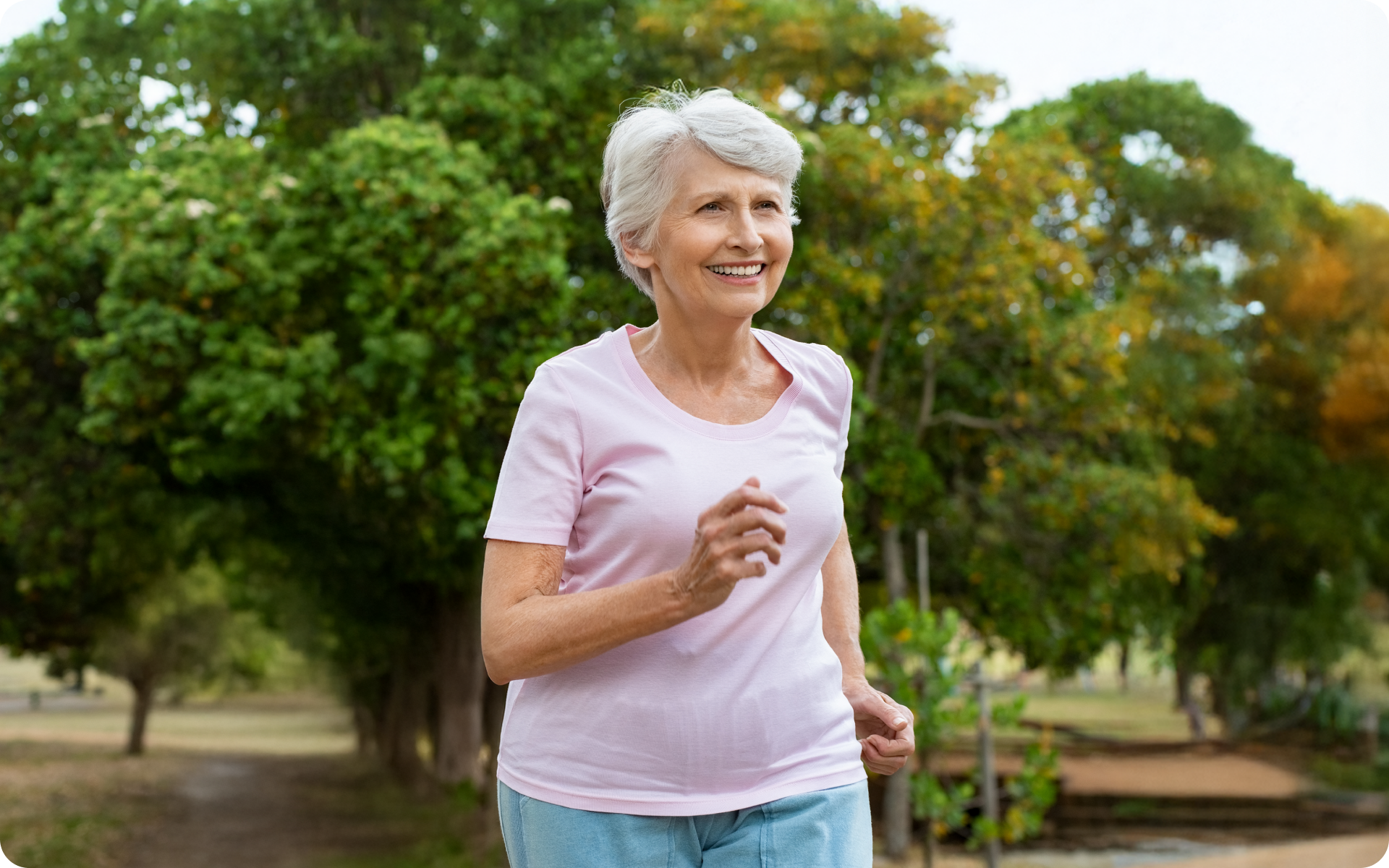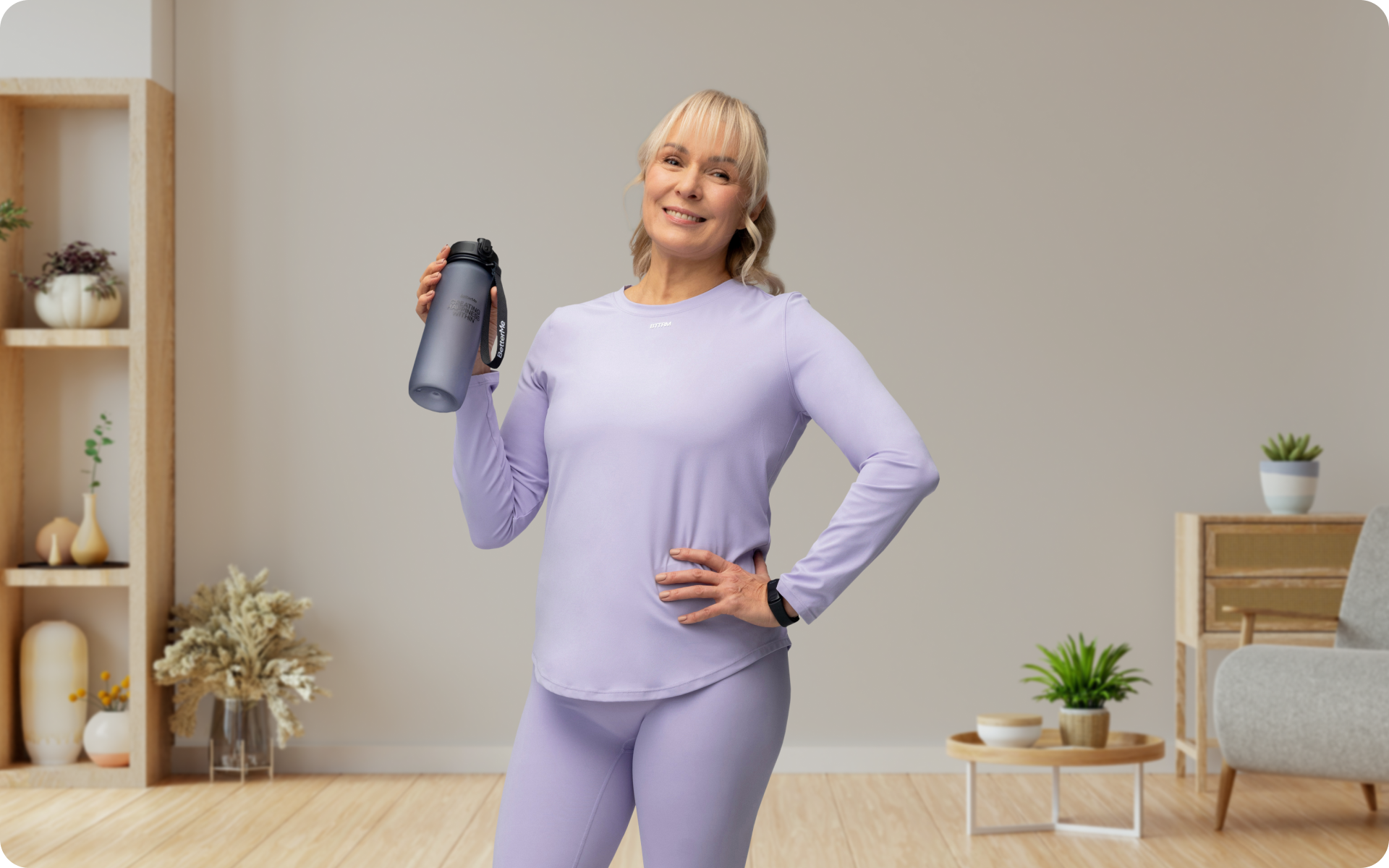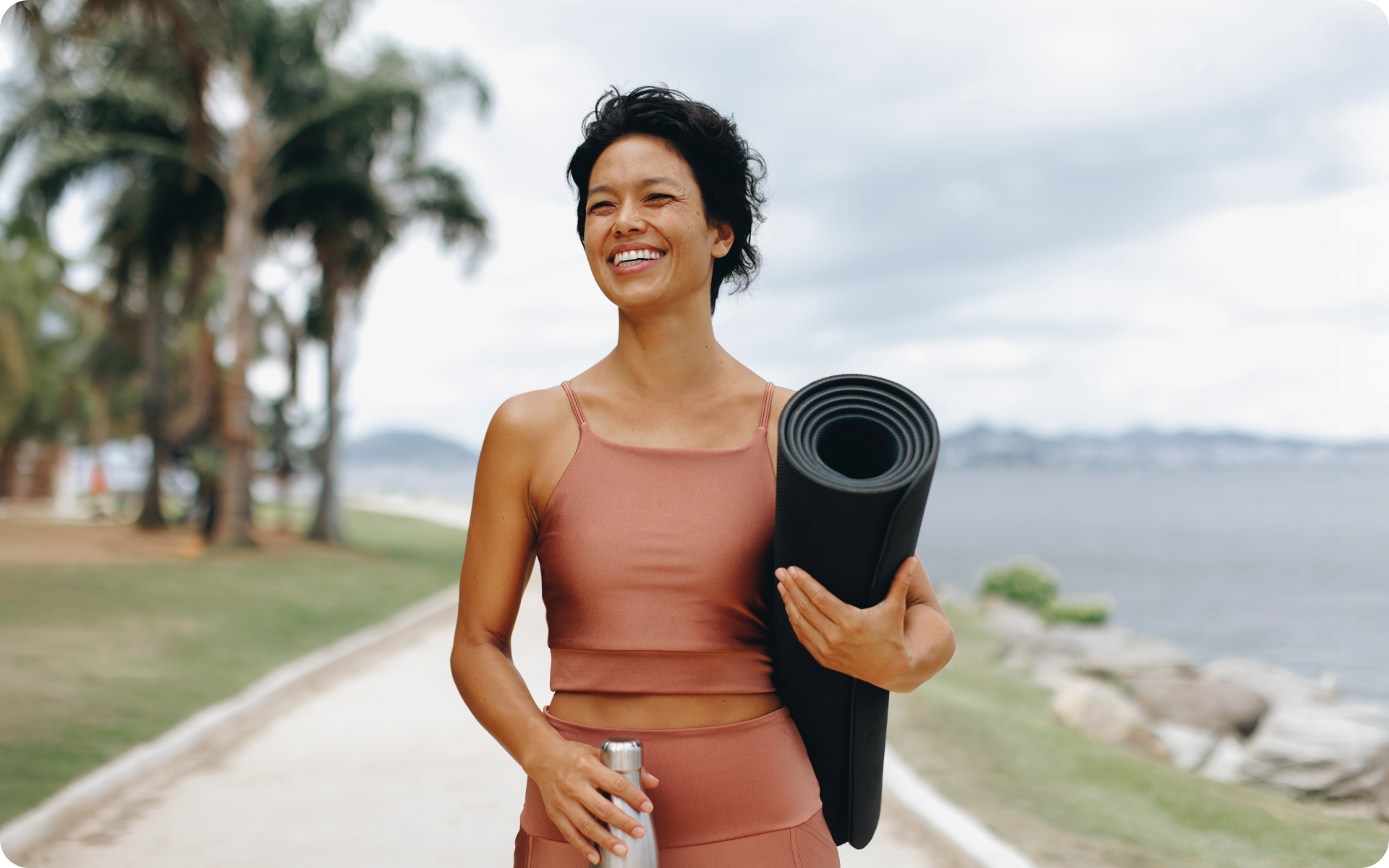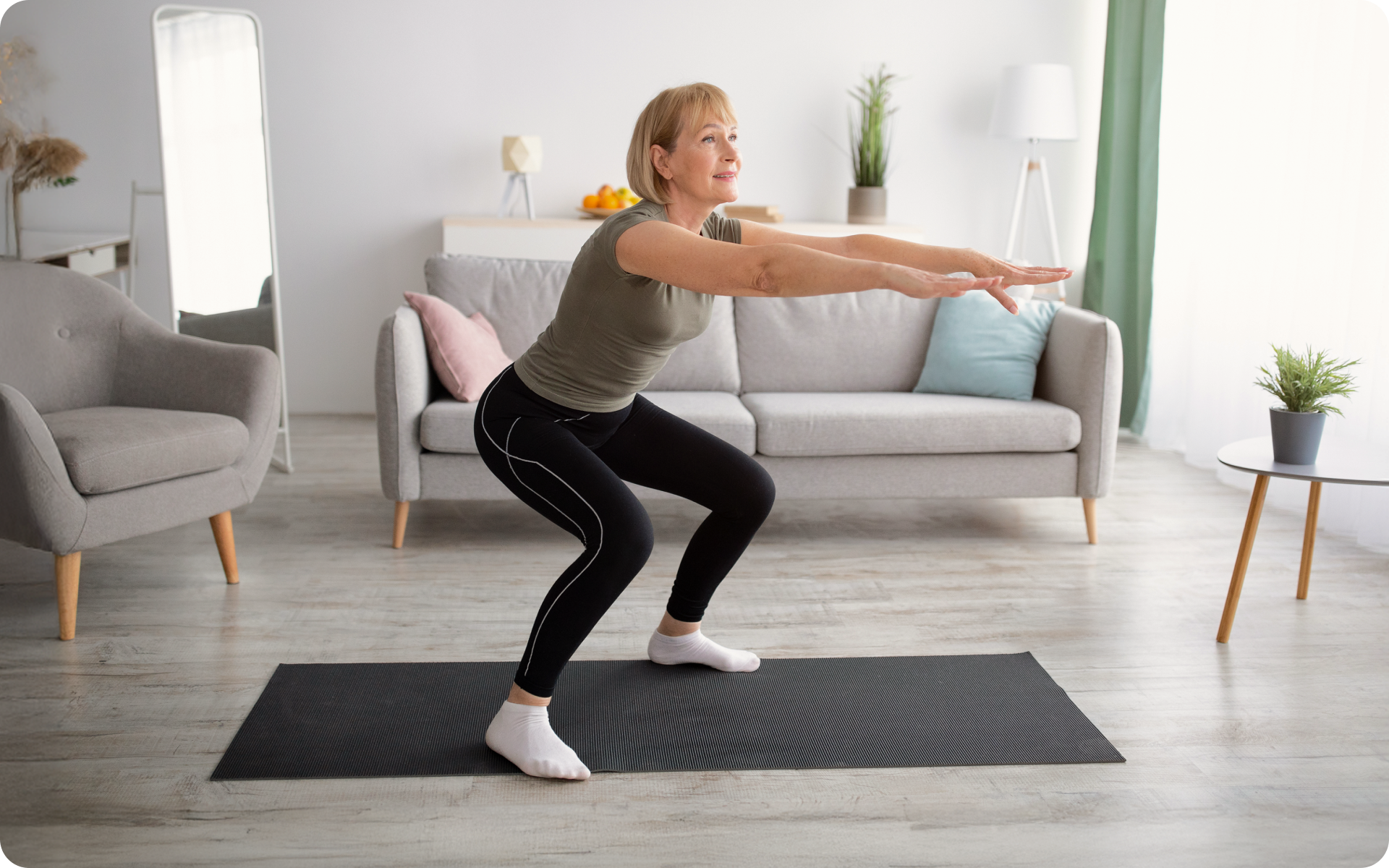When you hit the gym for a workout, you expect to end up feeling energized and ready to tackle the rest of your day. Normally, that’s the case. Exercise triggers the release of endorphins, which can make you feel energized and upbeat.
But sometimes, after a good workout, you may find yourself feeling tired and sleepy instead. This can be confusing—you just completed an activity that’s meant to raise your energy levels and make you feel great! Why do you feel ready for a nap?
Let’s explore why you may be feeling sleepy after a workout and what you can do about it. We’ll also tell you whether or not you should nap, how to time your workouts, and offer other tips to help you stay energized.
Why Do I Get Sleepy After a Workout?
There are several possible explanations for why you feel sleepy after a workout:
Exercise-Induced Fatigue
Research into how physical activity affects energy levels has found that exercise-induced fatigue is a real phenomenon (1). This refers to feeling tired and exhausted after a workout, rather than the energizing effects of exercise
It’s believed that this fatigue is caused by a combination of factors, mainly changes in the nervous system.
There are two main parts that make up the nervous system: the central and peripheral nervous systems. The peripheral nervous system controls movement, such as when you’re lifting weights or running.
When you exercise, your peripheral nervous system is activated, which causes an increase in heart rate, respiration, and blood flow. This causes your body to work harder than it normally would during restful activities (1).
The central nervous system regulates cognitive processes, such as making decisions and thinking. When you exercise, the stimulation of your peripheral nervous system causes a decrease in your central nervous system activity, which can lead to a feeling of fatigue and sleepiness after a workout (1).
Some theories suggest that the fatigue we experience after a workout is due to the body’s natural protective mechanism, which kicks into gear when it senses that you’ve exerted too much energy (8).
Dehydration
Dehydration is a possible explanation for feeling sleepy after a workout. When you exercise, you sweat and lose fluids, which can lead to dehydration. Dehydration is characterized by symptoms including fatigue, dizziness, and headache (2).
In a small study, researchers found dehydration caused by exercise to be associated with an overall decrease in cognitive performance (4). This suggests that not drinking enough fluids after a workout can affect your mental alertness and contribute to feeling sleepy.
Low Blood Sugar
Low blood sugar is another potential explanation for feeling fatigued after a workout (7). When you exercise, your body uses up its stored sugar (glycogen) for energy.
If you don’t refuel with carbohydrates after working out, your blood sugar levels can drop, causing a feeling of fatigue and sleepiness.
If you’re not eating enough in general, this could contribute to low blood sugar and make you feel sleepy after a workout. This is particularly true if you eat below your basal metabolic rate, which is the amount of energy (calories) you need to perform basic body functions.
If you struggle to even flirt with the idea of giving up your favorite foods or working out till your legs give way – BetterMe app is here to breathe a fresh perspective into the way you view the weight loss process! Check out the app and experience the fun side of fitness and dieting with BetterMe!
Lack of Sleep
Research has shown that even one night of poor sleep can lead to increased fatigue, impaired cognitive functioning, and decreased motivation the next day (13). It could take a toll on your energy levels and cause post-workout drowsiness.
Poor sleep habits accumulate over time—if you’re consistently not getting enough sleep, this could cause a greater feeling of fatigue than usual.
Poor Nutrition
What you eat has a huge influence on your energy levels. Eating a diet low in nutrients or with a lot of highly processed food can make you feel tired (5), even after a workout. Your choice of pre- and post-workout snacks can also affect your energy levels.
Eating snacks that contain simple carbohydrates, such as bananas and granola bars, can help replenish lost energy and keep you energized throughout the day.
We’ve discussed the importance of nutrition further in our Should I work out on an empty stomach? article.
Overtraining Syndrome
Overtraining syndrome (OTS) is a condition where you work out too often and too intensely, which leads to decreased performance and increased fatigue.
OTS can lead to feeling tired after a workout or even during it. Some of the tell-tale signs of OTS include sleep disturbances, loss of appetite, decreased motivation to exercise, and mood changes. Over time, this can lead to more serious consequences, such as an increased risk of injury (12).
Can I Sleep After a Workout?
There are some pros and cons to taking a nap after a workout:
Pros
A nap can be a refreshing way to recharge your batteries after a workout. It can also help you recover by restoring energy, replenishing glycogen stores, and repairing muscle damage sustained during exercise (15).
Cons
Napping too much or for too long can disrupt your natural circadian rhythm and make it harder to fall asleep at night. In addition, naps can sometimes lead to sleep inertia, which is a feeling of grogginess and disorientation (14).
How Much Sleep Should I Have After Workout?
The optimal amount of sleep after a workout is based on the National Sleep Foundation’s recommended nap guidelines.
The National Sleep Foundation recommends that power naps (naps that last between 10 and 20 minutes) should be taken no more than three times a week, with the ideal nap time being between 1 pm and 3 pm (11). This allows you to get the benefits of a refreshing nap without disrupting your sleep cycle too much.
If you need more than 20 minutes of sleep to feel rested, you should opt for 90 minutes of sleep instead (11). This is known as a “recuperative nap” and can help restore your energy levels while avoiding the sleep inertia that is associated with longer naps.
Read more: Mouth Taping For Sleep & Snoring: Fact Or Fad
How to Prevent Feeling Sleepy After a Workout
If you’re feeling sleepy after a workout, there are some things you can do to help:
Hydrate Before and After Your Workout
Make sure you drink enough water throughout the day and before and after your workout. This will help prevent dehydration, which can lead to fatigue and sleepiness after a workout.
The recommended daily water intake for adults is 2.7 liters (approximately 91 ounces). However, if you’re exercising, you should be drinking up to 3.7 liters (approximately 125 ounces) per day (16).
Eat Enough to Fuel Your Workouts
Make sure you eat enough calories and nutrients to fuel your workouts. This means making sure you get enough protein, carbohydrates, healthy fats, vitamins, and minerals in your diet (10). It also includes your daily caloric intake. This is a number that is unique to you and involves your basal metabolic rate and the amount of calories you burn through exercise. Depending on your goals, you’ll want to make sure you eat enough total calories in a day to keep you energized for your exercise and day-to-day life.
Eating nutrient-dense snacks before and after your workout can help keep you energized throughout the day.
Some of the best pre- and post-workout snacks are yogurt with fruit, trail mix, energy bars, peanut butter on toast, or a protein shake.
Taking a daily multivitamin or supplementing with specific vitamins and minerals, such as B-complex vitamins, iron, and magnesium, can help increase your energy levels (9).
However, it’s important to talk to your doctor before you take any supplements, as taking too much of certain vitamins and minerals can be dangerous.
Get Enough Sleep at Night
One of the best ways to make sure you have enough energy for a workout is by getting enough sleep at night. The National Sleep Foundation recommends that adults get 7-9 hours of sleep each night (6).
Consistently getting enough sleep will help you feel more energized throughout the day and can increase your ability to handle an intense workout.
Below are some sleep hygiene tips that can help you get a good night’s rest:
- Avoid screens (phones, computers, TVs) for at least an hour before bedtime
- Create a relaxing sleep ritual such as listening to soothing music or reading a book
- Make sure your bedroom is dark, quiet, and cool
- Avoid large meals or caffeine close to bedtime
- Exercise regularly and get plenty of natural sunlight during the day
Review Your Workout Routine
If you constantly feel sleepy after a workout, it may be time to review your routine. Make sure you’re not pushing yourself too hard. It’s important to recognize when your body needs a break and adjust the intensity of your workouts accordingly.
A good rule of thumb is to start out with a lower intensity and gradually increase the difficulty as your body adjusts. Rest days are also important and should be worked into your routine.
You should aim for 2-3 rest days each week. These days can either be a total rest day of doing little to no movement or an active rest day where you do light movement such as walking. During these active rest days, you can also focus on stretching, foam rolling, or other restorative activities.
Find out whether bodyweight training or going to the gym is right for you in our Bodyweight vs weights blog post.
Cool Down After Your Workout
Cooling down after a workout is an important part of recovery. It serves multiple purposes, including allowing your body to gradually transition from an intense activity to a resting state. It can also help reduce lactic acid buildup in your muscles and improve flexibility (3).
A cool-down should last for 5-10 minutes and can include light stretching, foam rolling, or a slow jog or walk. This may help reduce the risk of feeling sleepy after a workout, as your body will likely be better able to transition back into a resting state without feeling too fatigued.
Whether you’re a workout beast or just a beginner making your first foray into the world of fitness and dieting – BetterMe has a lot to offer to both newbies and experts! Install the app and experience the versatility first-hand!
A post-nap workout can be an effective way to boost your energy levels and recovery, but too much sleep can derail your fitness goals and leave you feeling groggy. So, when it comes to post-workout napping, there are several factors to consider before you doze off. If napping isn’t for you, there are other ways to reap similar benefits, such as taking a relaxing bath, listening to calming music, or practicing deep breathing exercises. Feeling overly fatigued or exhausted after just a few minutes of exercise can be frustrating and demotivating. However, this is a common issue that many people face and there are several possible reasons for it. Arguably the most obvious reason why you may feel tired after 5 minutes of exercise is simply not getting enough sleep. Your body needs adequate rest to function properly, and if you don’t get enough quality sleep, even mild physical activity can feel exhausting (15). Another potential cause of fatigue during exercise is dehydration. When you sweat, your body loses water and essential electrolytes that are necessary for proper muscle function. If you don’t drink enough water before and during exercise, your body may not have the necessary resources to sustain prolonged physical activity (4). Your body needs glucose for energy, and if your blood sugar levels drop too low, it can lead to fatigue and dizziness during exercise. This is especially common if you haven’t eaten enough before a workout or have an underlying medical condition such as diabetes. Along with low blood sugar, a lack of proper nutrition overall can also contribute to feeling tired after just 5 minutes of exercise. Your body needs a balanced diet to provide the necessary nutrients for energy and muscle repair (10). Sometimes, feeling tired after minimal exercise can be a sign of an underlying medical condition such as anemia or thyroid problems. If you consistently experience extreme fatigue during or after exercise, it’s important to consult a doctor to rule out any potential health issues. Lack of Conditioning It could also be that your body isn’t in the best shape right now and you need to develop more cardiovascular endurance. This process takes time and with repeated effort and consistency, you can improve your overall cardio fitness. Try not to be too discouraged if you feel tired after only 5 minutes of exercise. Improving your fitness takes time. Yes, naps can be beneficial for muscle recovery after a workout. When you exercise, your muscles experience small tears that need time to heal and repair for them to grow stronger. Napping can provide the necessary downtime for this process to occur, which leads to better muscle development and recovery (15). In addition, napping helps the body restore energy levels and enhance cognitive function, both of which are important for overall physical and mental well-being (15). However, it’s important to keep naps short (20-30 minutes) and within an hour or two after your workout. Napping for too long or too late in the day can disrupt your natural sleep patterns and interfere with overall recovery. It’s also important to listen to your body and adjust as needed – if napping after a workout doesn’t make you feel refreshed, it may not be the best option for you. Exercise is physical exertion and can be taxing on your body, especially if you’re not used to it. Feeling exhausted after exercising can be attributed to several factors such as dehydration, lack of sleep, and low blood sugar (15). In addition, if you push yourself too hard or engage in intense workouts without proper rest and recovery, it can leave you feeling drained and fatigued. Furthermore, exercise activates the sympathetic nervous system, which prepares the body for physical activity by increasing heart rate and blood flow. This can also lead to feelings of exhaustion as the body works harder to meet the demands of exercise. It’s important to listen to your body and give it the necessary time to rest and recover after a workout. This can include implementing post-workout recovery methods such as stretching, foam rolling, and adequate hydration. Practicing good sleep habits and maintaining a balanced diet can also help prevent feelings of exhaustion after exercising. FAQs
Should I nap after a workout?
Factors to Consider
The Pros of Napping After a Workout
The Cons of Napping After a Workout
Why do I get tired after 5 minutes of exercise?
Lack of Sleep
Dehydration
Low Blood Sugar
Lack of Proper Nutrition
Underlying Medical Conditions
Do naps help muscle recovery?
Why do we feel exhausted after exercising?
The Bottom Line
Taking a nap after a workout can be beneficial for restoring energy, replenishing glycogen stores, and repairing muscle damage. However, it’s important to know your own limits and not exceed the recommended nap guidelines.
In addition, following good sleep hygiene practices and eating enough to fuel your workouts can help you get the most out of your workout without feeling overly tired afterwards.
DISCLAIMER:
This article is intended for general informational purposes only and does not serve to address individual circumstances. It is not a substitute for professional advice or help and should not be relied on for making any kind of decision-making. Any action taken as a direct or indirect result of the information in this article is entirely at your own risk and is your sole responsibility.
BetterMe, its content staff, and its medical advisors accept no responsibility for inaccuracies, errors, misstatements, inconsistencies, or omissions and specifically disclaim any liability, loss or risk, personal, professional or otherwise, which may be incurred as a consequence, directly or indirectly, of the use and/or application of any content.
You should always seek the advice of your physician or other qualified health provider with any questions you may have regarding a medical condition or your specific situation. Never disregard professional medical advice or delay seeking it because of BetterMe content. If you suspect or think you may have a medical emergency, call your doctor.
SOURCES
- Central and Peripheral Fatigue in Physical Exercise Explained: A Narrative Review (2022, nih.gov)
- Dehydration Headache (2021, clevelandclinic.org)
- Do We Need a Cool-Down After Exercise? A Narrative Review of the Psychophysiological Effects and the Effects on Performance, Injuries and the Long-Term Adaptive Response (2018, nih.gov)
- Effects of Dehydration and Rehydration on Cognitive Performance and Mood among Male College Students in Cangzhou, China: A Self-Controlled Trial (2019, nih.gov)
- Food and your mood (2023,betterhealth.vic.gov.au)
- How Much Sleep Do We Really Need? (2023, sleepfoundation.org)
- Hypoglycemia (2022, mayoclinic.org)
- Muscle fatigue: general understanding and treatment (2017, nih.gov)
- Multivitamins and minerals modulate whole-body energy metabolism and cerebral blood-flow during cognitive task performance: (216,nih.gov)
- Nutrition and athletic performance (2023,medlineplus.gov)
- Napping: Benefits and Tips (2023, sleepfoundation.org)
- Overtraining Syndrome (2012, nih.gov)
- Sleep deprivation: Impact on cognitive performance (2007, nih.gov)
- Sleep Inertia (2023, sleepfoundation.org)
- Should I Nap Right After My Workout? (2023,sleepfoundation.org)
- Water: How much should you drink every day? (2022, mayoclinic.org)
